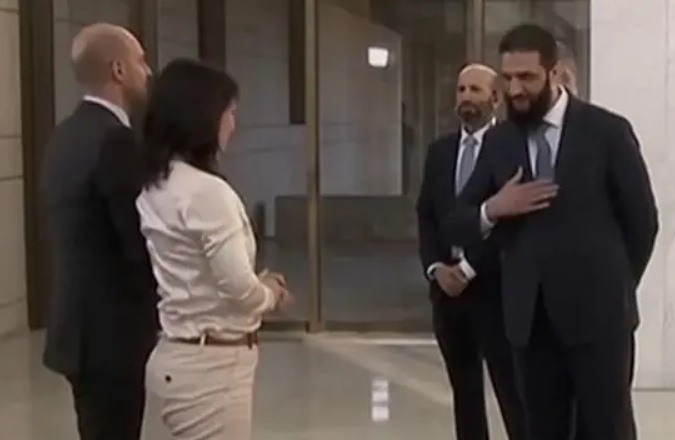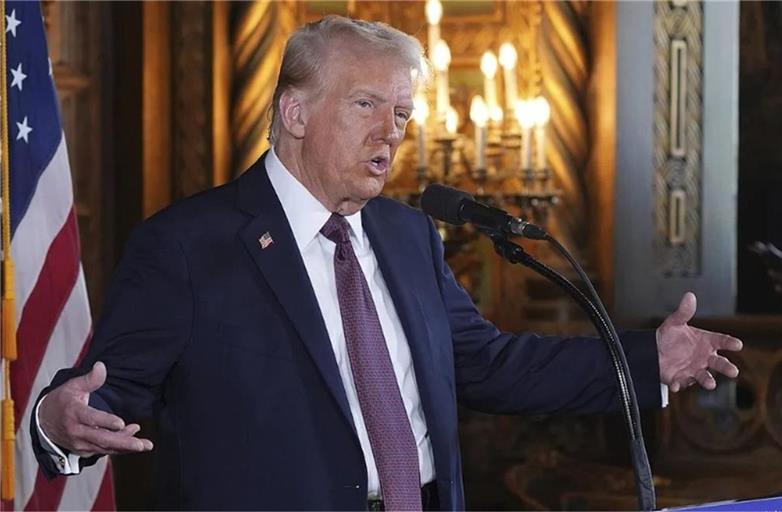Syria's new leader refuses to shake hands with women, German foreign minister: no surprise

German Foreign Minister Annalena Baerbock and her French counterpart, Catherine Colonna de Levis Barro, visited Damascus, Syria's capital, on January 3 local time to meet with the leadership of the new provisional government. But an awkward moment occurred during the welcoming ceremony: the head of the provisional government, Ahmad al-Sharaa, refused to shake hands with Baerbock.
Speaking to reporters on the evening of January 3 local time, Baerbock said that it had been obvious from the outset that the situation would not develop in a normal way, but that she and the French foreign minister did not agree to the behavior. In a statement, Barro also said that the provisional government had promised a wide range of participation by Syrian citizens, including women, in the political transition.
In a video released by Barro and Baerbock, al-Sharaa went to greet the two officials with some senior members of the provisional government. He took the initiative to shake Barro's hand, and Barro also reached out her hand for a greeting. But al-Sharaa stopped short and did not fully shake Barro's hand.
When Baerbock held out her hand to al-Sharaa, he pressed his hand to his chest, bowed slightly, and then stood silently, without shaking hands with her.
After the two sides concluded their conversation outside and prepared to retreat, al-Sharaa extended his hand, but he and Baerbock did not end up shaking hands. Volk Perthes, a former director of the German Council on Foreign Relations, said the refusal to shake hands is a "bad sign," and it's "not a Syrian tradition."
The UK-based newspaper Al-Araby Al-Jadeed stated that certain strands of Islam prohibit men and women who are not closely related from shaking hands. According to Politico, the awkward moment when al-Sharaa refused to shake hands with Baerbock became an instant headline, with Germany's Bild giving it the label "the handshake scandal."
Speaking to reporters on January 3 local time, Baerbock said, "When I came here, it was clear that a normal handshake would not be possible. But it was apparent that not only I, but also the French foreign minister, did not want to agree to this. So the French foreign minister did not extend a hand."
Baerbock told media that the starting point for a new era of relations between Europe and Syria is that the provisional government protects the rights of all ethnic and religious groups, and gives them a place in the political process.
In a statement, Barro said that during the meeting with al-Sharaa, the French and German foreign ministers raised the rights of Syrian women in particular, and the provisional government of Syria, "guaranteed that the political transition process would be accompanied by widespread participation among Syrian society, including women."
Baerbock and Barro are the first high-ranking European officials to visit the country since Syrian President Bashar al-Assad was ousted from power. Reuters reported that during the meeting with al-Sharaa, the two stated that the EU hopes to create a new relationship with Syria. But if the provisional government wants to win the support of the EU, all groups of Syrian society must be part of the political transition – this includes women and Kurds.
Since taking control of Damascus, the "National Salvation Government" has strived to present itself in a moderate fashion, stressing on multiple occasions that it will respect the rights of all Syrians. But as Politico pointed out, given that it was historically associated with religious extremism, the takeover of Damascus by the Salvation Government raises concerns about the rights of women and minority groups in Syria.
On December 12, the "National Salvation Government" military chief, Ali al-Hamwi, gave his first extensive interview to the British magazine The Economist. He said his government would protect religious minorities, put all armed groups under government control, and form an inclusive government that represents all Syrians. He claimed that there would be no place for "jihadists" in Syria's future.
Al-Sharaa also said in an interview with the British Broadcasting Corporation (BBC) that in his view, women should have the right to education.
The National Salvation Government had earlier pledged to hold parliamentary elections within 15 months to choose the members of a constitutional committee, which would draft a new constitution that gives all Syrians a voice in political life. However, al-Sharaa failed to clearly answer whether alcohol would be allowed in the future Syrian society.
"We will work on the new system and establish a committee of legal experts for that purpose," al-Sharaa said, adding that the committee will be in charge of choosing the form of government. He also promised that there would be a new political system "suitable for Syrian society and for all Syrians."
Al-Sharaa asserted that Syria will "certainly" establish a system of government "that will guarantee the protection of all citizens regardless of their color, ethnicity, or religion."
In a December 29 interview with Saudi Arabia's Al-Arabiya TV, al-Sharaa said his government intends to set up a national dialogue conference including all segments of Syrian society. He estimated that drafting the constitution and electing the national assembly to amend the constitution would take three years, and that holding presidential and parliamentary elections will take another four years.
 Famous Persons
Famous Persons English
English
 Jerry
Jerry Facebook
Facebook Twitter
Twitter Pinterest
Pinterest Linkin
Linkin Email
Email Copy Link
Copy Link










